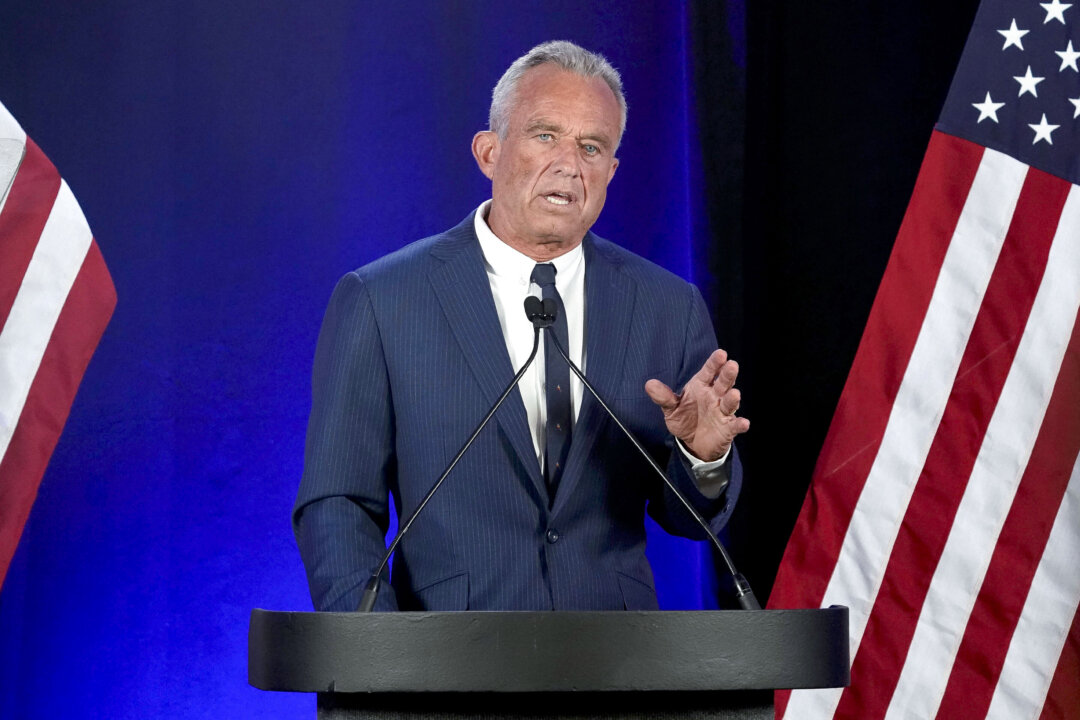Robert F. Kennedy Jr. recently told supporters he would withdraw from the ballots in swing states.
Robert F. Kennedy Jr. is remaining on the ballots in Michigan and Wisconsin.
The Wisconsin Elections Commission voted 5–1 on Aug. 27 to keep Kennedy’s name on the ballot in the state. Commissioners turned down Kennedy’s request to remove his name as an option for voters and approved other third-party candidates, including Jill Stein and Cornel West, as options.
A spokesperson representing Michigan Secretary of State Jocelyn Benson told news outlets in a statement earlier Tuesday that Kennedy would remain on Michigan’s ballot.
“Minor party candidates cannot withdraw, so his name will remain on the ballot in the November election,” the spokespersons said.
Kennedy told supporters when he suspended his campaign earlier this month that he would be withdrawing his name from ballots in battleground states, saying he wanted to avoid being a spoiler.
“In about 10 battleground states where my presence would be a spoiler, I’m going to remove my name,“ Kennedy said. ”I’ve already started that process and urge voters not to vote for me.”
Wisconsin and Michigan are both battleground states. Former President Donald Trump narrowly won both in 2016, but lost to President Joe Biden in both in 2020.
Kennedy in recent polls has had limited support in the swing states. In one survey from July 31 through Aug. 8, for example, 5 percent of respondents in Michigan said they would vote for Kennedy if the election were held on the day they were surveyed. In another poll, 3 percent of Wisconsin respondents said they would vote for Kennedy.
During the Wisconsin Elections Commission meeting, Republican commissioners advocated for granting Kennedy’s request for removal, but the commission deadlocked under opposition from Democrats who pointed to Wisconsin state law that says once a candidate has filed for office, they must remain on the ballot unless they die.
Republican commissioner Don Millis made a motion to remove Kennedy, but it failed in a 3–3 vote. Millis and one other Republican commissioner then sided with all three Democrat members in voting to place Kennedy and others on the ballot as independents.
The candidate has already started the process of removing his name from the ballots in several other swing states, including Arizona and Pennsylvania, as well as states that generally are considered red or blue, such as Florida and Texas.
Ohio Secretary of State Frank LaRose said after Kennedy’s announcement that his office received written confirmation from Kennedy’s campaign seeking his withdrawal, and that the candidate as a result will not appear on the ballot in the state.
Officials in some other states have turned down Kennedy’s attempts to gain access to the ballot. A judge in Georgia this week said Kennedy was not eligible to appear on the ballot given issues with his petition, although the final decision is up to Georgia’s secretary of state.
In still other states, Kennedy cannot under the law remove his name from the ballot.
Nevada law, for instance, only allows requests for withdrawals until seven business days after the deadline for filing, which this year was Aug. 9.
The Associated Press contributed to this report.

